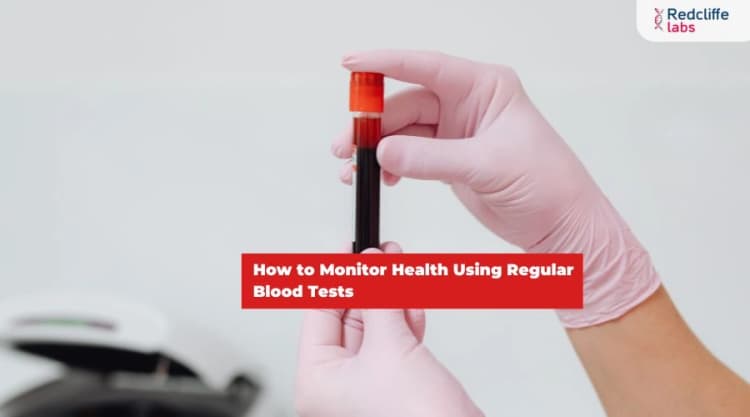Blood
Unlock special
discount on
this package
Login to Unlock 🔓
package Instructions
NABL Accredited lab*




Booking Benefits Unlocked Worth FREE 799

Report Consultation

Diet Plan
*Available once your report is generated.
At Redcliffe Labs, we have a single goal: to give India its right to quality diagnostics.
Customers served
Tests Processed Everyday
Cities
Collection Centres
World Class In-house Labs
Home Collection Experts
3 Test Parameters
Follicle Stimulating Hormone (FSH)
1 PARAMETER INCLUDED
1 PARAMETER INCLUDED
Luteinizing Hormone (LH)
1 PARAMETER INCLUDED
1 PARAMETER INCLUDED
- LH / Luteinizing Hormone
Prolactin (PRL)
1 PARAMETER INCLUDED
1 PARAMETER INCLUDED
Helps you know your test better
Who all are eligible for this test?
- To check thyroid levels, testosterone, estrogen, and cortisol status.
- Women with hormonal imbalance (menopause, pre-menopause).
- Overweight people.
- People who consume excess alcohol are smokers.
- People who are exposed to high levels of pesticides and toxins.
Why take this test?
- To treat abnormal hormone levels.
- To investigate issues related to fertility, menopause, the menstrual cycle, and puberty.
- To detect hormonal imbalance associated with symptoms, such as mood swings, fatigue, weight gain, irregular periods, etc
- It tells you about your fertility status (the ability to get pregnant), menstrual cycle, and other health conditions, including reproduction, mood, growth, metabolism, and sexual health.
- Hormone level tests detect any hormonal deficiency or abnormally high levels.
- It controls the development of the reproduction process.
What are the benefits of hormone levels test ?
- It helps to find out the symptoms of hormone imbalance.
- This test addresses issues related to menopause, fertility, puberty, and other similar conditions.
- It tells the status and the functions of ovaries.
- Also play a role in diagnosing medical conditions such as thyroid disease or diabetes.
- It helps to evaluate how well a medication is working.
- Analyze and treat hormonal imbalances that are making you ill.
- This test sometimes also requires saliva samples apart from blood.
- Helps to detect any cysts or lumps in the reproductive organs and their proper treatment.
- Helps with the replacement therapy (hormones).
Top Booked Health Checkup Packages
Reports in 12 hours
|Parameters 94
Reports in 12 hours
|Parameters 89
Reports in 12 hours
|Parameters 96
Reports in 12 hours
|Parameters 96
Reports in 12 hours
|Parameters 90
Helps you know your test better
Q. What is the importance of the luteinizing hormone?
Q. What is follicle stimulating hormone?
Q. What is the function of prolactin in females?
Q. What is the significance of these three hormones altogether?
Verified by Medical Expert

WRITTEN BY
Sheena Mehta

MEDICALLY REVIEWED BY
Dr. Pradeep Lodha
Table of Content
Introduction to Hormone Test
The female hormone test is a crucial diagnostic tool for evaluating hormonal balance, reproductive health, and underlying diseases like PCOS, menopause, or infertility concerns. Hormones control almost all the body’s processes, including mood, metabolism, menstrual cycles, and sleep habits. For women who exhibit symptoms such as irregular periods, mood swings, or infertility, the female hormone test is crucial.
The female hormone test measures hormones like prolactin, LH, and FSH and can help create efficient treatment strategies and provide insightful information about general health. The test is essential for preserving health and well-being, whether planning a pregnancy, managing menopause, or dealing with unexplained symptoms.
Test Details in Brief
| Also Known As | Female hormone panel, hormonal assay, estrogen test, progesterone test, follicle-stimulating hormone (FSH) test, luteinizing hormone (LH) test, thyroid function test |
| Purpose | To monitor reproductive health, hormonal balance, or health conditions such as PCOS or fertility issues. |
| Preparation | Inform your doctor about your recent medications. |
| Fasting | The test needs no fasting. |
| Get Reports Within | 13 Hours |
| Cost | INR 899 |
What Is Hormone Test For Female?
Hormones play a vital role in females. From mood swings to the menstrual cycle, hormones control everything. A female hormone test helps evaluate women's internal condition and understand the effects on processes like physical development, mood, and reproduction.
FSH, LH, and PRL are three important hormones in the female body. A hormone test for females can detect hormonal imbalances, track menopause, and confirm the cause of reproductive health.
What is the Purpose of the Female Hormone Test?
Doctors commonly perform the female hormone test to check for fertility complications. Three major components are FSH, LH, and Prolactin (PRL). Early screening can help monitor several body functions, such as digestion, growth, ovulation, menstrual cycle, conception, fertilization, metabolism, sleep-wake cycle, and homeostasis.
The female hormone screening test is vital for detecting pregnancy, the cause of reproductive complications, tracking menopause, and detecting hormonal imbalances. It can also help understand several illnesses or infections.
What Does The Female Hormone Test Measure?
The female hormone test measures the health of the reproductive system, menstrual health, and overall hormonal balance. The female hormone screening test measures three key components: FSH, LH, and PRL.
Follicle-Stimulating Hormone (FSH)- FSH regulates the growth of ovarian follicles and the menstrual cycle. Through the hormone test, you can evaluate ovarian reserve, diagnose menopause, and assess fertility issues.
Luteinizing Hormone (LH)—LH promotes estrogen production and triggers ovulation, as well as progesterone after ovulation. The female hormone screening test can evaluate health conditions, such as PCOS and fertility.
Prolactin (PRL)- Prolactin is necessary for breast milk production. Excessive prolactin can suppress ovulation, leading to an irregular menstrual cycle. Through the female hormone test, your doctor can diagnose the cause of irregular menstrual cycle or infertility.
Benefits of Taking the Female Hormone Test
The female hormone test benefits women and individuals assigned female at birth for several reasons. The test provides insights about reproductive health through diagnosing, monitoring, and screening.
The female hormone screening test can diagnose medical conditions such as infertility, early menopause, PCOS, or delayed hormonal development.
Your doctor can get information about your health and assign a treatment. The test can monitor hormone levels in transgender women who have gender-affirming hormone treatment. Through the female hormone test, the doctor can check the efficiency of the treatment.
Women with irregular menstrual cycles should take the female hormone test to check their health regularly. The hormone test can help women know whether they are pregnant before surgery or admitted to the hospital.
Why Can Your Doctor Recommend The Female Hormone Test?
Your doctor may recommend the female hormone test for several reasons, which can help evaluate your reproductive health and overall well-being. Some common reasons your doctor can recommend the female hormone test include:
- Reason for Infertility
- Irregular menstrual cycles
- Symptoms of menopause or perimenopause
- Ovarian function evaluation
- Thyroid dysfunction
- Hair loss or abnormal hair growth
- Breast or ovarian health issues
- Evaluation of hormonal replacement therapy (HRT)
The female hormone test can provide insights into underlying hormonal imbalances, which can help guide lifestyle changes and appropriate treatment. The test results can allow your doctor to combine symptoms and medical history and create a more accurate diagnosis and personalized treatment plan.
Symptoms Indicating The Need of the Female Hormone Test
A hormone test can determine health conditions related to FSH, LH, and PRL hormones. But how will you identify the symptoms and signs of any irregularity? Below, we have listed 10 symptoms that can help identify.
- Mood swings
- Unnecessary weight gain
- Irregular or slow heart rate
- Trouble sleeping
- Change in hair or skin
- Unexplained irritation
- Constipation or diarrhea
- Nausea or vomiting
- Feeling cold
- Excessive fatigue or weakness
Who is at the Risk of The Female Hormone Test?
Symptoms are the first step towards identifying hormonal imbalance. However, certain women are at risk, which makes it mandatory for them to take the female hormone screening test.
- Women under 40 who experience signs of menopause (vaginal dryness, trouble sleeping, or hot flashes).
- Complications in pregnancy
- Infertility
- Signs of pregnancy (missed periods, nausea, frequent urination, tender breasts)
- Acne
- Abnormal hair growth
- Abnormal vaginal bleeding or longer than usual bleeding during periods
- Bleeding between periods
Preparation for the Female Hormone Test
A crucial first step in ensuring accurate and significant findings from a female hormone test is preparation. The procedure isn't difficult, but there are a few things you should be aware of because hormones change over the menstrual cycle and can be affected by particular foods, drugs, and even the time of day.
Timing of the Test:
The most important part of being ready is knowing when to take the test throughout your menstrual cycle. The hormones being analyzed will determine which days your doctor suggests for testing. For instance, doctors frequently conduct tests for progesterone and estrogen at particular stages of the cycle.
Follicular phase (Days 1-14): This is when estrogen is rising, and the test can assess ovarian function.
Luteal phase (Days 14-28): Progesterone levels peak after ovulation, so tests during this time can help assess ovulation and reproductive health.
Fasting Restriction:
Female hormone tests rarely require fasting, although some can ask you to abstain from meals for a few hours prior. Asking your doctor or reading the lab instructions is usually a good idea. The doctor or lab instructions might also request that you abstain from meals or drinks (such as alcohol or caffeine) that might momentarily alter your hormone levels.
Medications:
Certain drugs can affect your hormone levels, especially hormone-based medicines like birth control pills. Any medications you take, including supplements, should be disclosed to your doctor. They may recommend stopping particular prescriptions before the test. Never discontinue taking a drug without first consulting your physician.
Stress and Lifestyle factor:
Your lifestyle might impact hormone levels. In the days preceding your test, try to avoid becoming overly stressed, as this might raise cortisol and interfere with hormones related to reproduction. You can engage in frequent exercise, but make sure to avoid vigorous exercise the day before the test, as it could skew the results.
Time of Day:
Since some hormones, like cortisol, have a daily cycle, your doctor may advise you to test when hormone levels are greatest in the morning.
Female Hormone Test Procedure
The process of obtaining a female hormone test is easy to understand and depends on the sample your lab or doctor requires. Although saliva, urine, or blood tests can be used to evaluate hormones, blood tests are the most widely used technique.
A blood test is the most widely used technique for determining female hormone levels. This technique may measure important reproductive hormones like estrogen, progesterone, FSH, LH, and prolactin with extreme accuracy. This is what to anticipate:
- After reaching your home, our phlebotomist will walk you through the procedure, which is simple. They will ask you to be comfortable before and during the sample collection.
- They will insert a tiny needle to collect a blood sample from a vein in your arm. It's a quick process that usually only takes a few minutes. While some people report a small pinch, most report only mild discomfort.
- The number of tubes used to collect blood depends on the number of hormones examined.
- Following the blood sample, a tiny bandage may be applied to the puncture site. While little bruising or pain is possible, they normally go away fast.
Risks Associated With The Female Hormone Test
The female hormone test is a blood test that provides no risk. However, your blood is drawn from a sterile syringe, which may result in hematoma, excessive blood loss, bruises, weakness, fatigue, and dizziness.
Understanding the Female Hormone Test
The Female Hormone Test Can help evaluate the function of FSH, LH, and Prolactin (PRL). We provide the test reports within 12 hours with 100% accurate results. The test detects overall reproductive health. Here is the normal range of these three main hormones, essential for a menstrual cycle or reproductive health.
Follicle-stimulating hormone (FSH)
| Category | Range |
| Follicular phase | 3-10 IU/mL |
| Mid-cycle peak (Ovulation) | 6-20 IU/mL |
| Luteal Phase | 1.5-9 IU/mL |
| Post-menopause | 30-120 IU/mL |
Luteinizing Hormone (LH)
| Category | Range |
| Follicular Phase | 1.5-9 IU/mL |
| Mid-cycle peak (ovulation) | 12-2.5 IU/mL |
| Luteal phase | 0.5- 16 IU/mL |
| Post-menopause | 15-55 IU/mL |
Prolactin (PRL)
Prolactin is an important hormone responsible for milk production. If the levels are high, it can affect ovulation. The normal range for prolactin is 2-29 ng/mL.
However, all these ranges may vary depending on the lab, measuring unit, and equipment. Your doctor can better help you understand the test reports.
How and why do women experience hormonal imbalances?
What causes hormonal imbalance?
Hormonal imbalances occur when too much or too little hormone is in the blood, disrupting the body's normal functions. Hormones are chemical messengers that help control various physiological processes, such as growth, metabolism, mood changes, and reproduction.
Due to the complex hormones in their reproductive system, women are more likely to experience hormonal imbalances.
Common Causes of Hormonal Imbalance in Women
- Puberty- Hormonal surges during adolescence can lead to mood swings, acne, and irregular menstrual cycles.
- Menstruation and Ovulation- Fluctuations in estrogen and progesterone levels during the menstrual cycle may cause premenstrual syndrome (PMS) or premenstrual dysphoric disorder (PMDD).
- Pregnancy- Dramatic increases in hormones like estrogen and progesterone occur, affecting mood, energy levels, and weight.
- Perimenopause and Menopause- Declining estrogen levels can cause mood swings, hot flashes, and changes in metabolism.
Lifestyle Factors
- Stress- Chronic stress releases cortisol, which may disrupt the balance of other hormones.
- Poor Diet- An unhealthy diet high in sugar and processed foods may affect insulin and leptin levels, which may cause hormonal imbalances.
- Lack of Sleep—Poor sleep quality may disrupt cortisol production and other hormones, including melatonin and growth hormone.
- Sedentary Lifestyle- Physical inactivity may negatively affect hormones like insulin and thyroid hormones.
Underlying Medical Conditions:
- Polycystic Ovary Syndrome (PCOS)- A condition where high levels of androgens interfere with ovulation.
- Thyroid Disorders- Hypothyroidism (underactive thyroid) and hyperthyroidism (overactive thyroid) can disrupt overall hormonal balance.
- Adrenal Gland Disorders- Overproduction of cortisol, as seen in Cushing’s syndrome, or insufficient production, as in Addison’s disease.
- Pituitary Gland Disorders- Tumors or dysfunction in the pituitary gland can affect hormone production.
External Factors
Contraceptives- The use of hormonal birth control pills, patches, or IUDs can affect hormone levels.
Health Issues
Obesity- People who are obese are at high risk of hormone changes because excess fat tissue produces estrogen, which may cause hormonal imbalance.
Diabetes—Impaired insulin regulation affects hormones; thus, people with diabetes may notice hormone changes frequently.
Chronic Infections or Autoimmune Conditions may interfere with hormone production or function.
If you notice any abnormal changes, consult your doctor. They may recommend a hormone imbalance test to detect your condition.
Why Women Experience Hormonal Imbalances More Frequently
Here are some reasons why women experience regular hormonal changes-
- Complex Reproductive System- Women's bodies go through regular hormonal changes due to menstrual cycles, pregnancy, and menopause.
- Higher Sensitivity to Endocrine Changes—Hormones like estrogen and progesterone play critical roles in fertility and overall health, making women more susceptible to hormone fluctuations.
- Stress Response Variations- Studies show that women experience more hormonal shifts in response to stress compared to men.
When to Seek Help
If you are experiencing any abnormal symptoms related to hormone changes, then do not avoid the symptoms and consult your doctor as soon as possible. Your doctor may advise you to undergo a hormonal imbalance test to evaluate your condition and determine the underlying causes.
What are Other Hormones That A Female Hormone Test Can Measure?
Other hormones that a female hormone screening test can evaluate include:
- Progesterone Test
- Testosterone Test
- Androstenedione Test
- DHEAS Test
- Menopause Test
- Estrogen Test
- Anti-Mullerian Hormone Test
- Human chorionic gonadotropin (hCG)
- Fertility test
- Thyroid-stimulating hormone (TSH)
- Free Triiodothyronine (T3) or Total T3
- Free Thyroxine (T4) or Total T4
- 17-Hydorxyprogesterone
- Insulin-like Growth Factor 1 (IGF-1)
Is It Safe To Get The Female Hormone Test at Home?
Yes, as long as you pick a trustworthy and respected service, getting a female hormone test at home is safe. Several diagnostic centers or hospitals sell kits for hormone testing at home that let you gather samples, usually via a finger-prick blood test, saliva sample, or urine sample.
To guarantee the precision and security of your findings, take account of the following factors:
- Book the female hormone test from a reputed diagnostic lab like Redcliffe Labs. We follow the Six Sigma process to provide 100% accurate results.
- Consult your healthcare provider to review the results, as they can interfere with symptoms, medical history, and menstrual cycles.
- Our phlebotomist will give you instructions; make sure to follow them, as improper sample collection could affect the test results.
Hormone Level Test Price
Redcliffe Labs is India’s leading diagnostic lab. We are available in 220+ cities and offer 3600+ tests. We aim to provide quality diagnostic service to everyone by making it affordable and accessible. Our test prices are the lowest and have the shortest turnaround time (TAT). Our female hormone test price is INR 899 with a home sample collection service.
You can avail of our services by booking the test online through our website and mobile app. We also provide comprehensive packages along with the female hormone test. Search for your desired test and book the test. Our phlebotomist will visit your home to collect samples. So, why wait? Book the female hormone screening test today!

Hormone Test Cost in Different Cities - Redcliffe Labs
| City Name | Discounted Price |
| Delhi | ₹899 |
| Ahmedabad | ₹899 |
| Mumbai | ₹899 |
| Bangalore | ₹899 |
| Noida | ₹899 |
| Pune | ₹899 |
| Lucknow | ₹899 |
| Hyderabad | ₹899 |
| Chennai | ₹899 |
| Gurgaon | ₹899 |
| Jaipur | ₹899 |
| Faridabad | ₹899 |
| Indore | ₹899 |
| Patna | ₹899 |
Note: We also offer Hormone Test PAN India. Please call the number 8988988787 to check the availability of our services in your area.
5 Simple Steps to Manage Your Health with Redcliffe Labs
Quick, Simple & Convenient; trusted care delivered to your doorstep.

Start Your Online Booking
Open the Redcliffe Labs website/app. Select the test or package and enter your details. Schedule the service for your preferred slot.

Live Tracking
Stay updated with real-time tracking for a smooth and timely home sample collection.

Sample Collection
Our certified experts ensure a smooth, hygienic, and fully compliant sample collection experience.

Doctor-Verified Smart Reports
Every report is clinically checked by expert doctors and shared with smart, actionable insights.

Your Health Journey Continues Post Reports
Consult with our expert medical team to get actionable insights to improve your health.
Nearby Labs(9)
Redcliffe Labs Noida

MC-5280
Redcliffe Collection Center
Redcliffe Collection Center
Redcliffe Collection Center
Redcliffe Collection Center
Redcliffe Collection Center
Redcliffe Collection Center
Redcliffe Collection Center
Redcliffe Collection Center
Frequently Asked Questions
What is a hormone test?
What is the price of a hormone test?
Why would I need a hormone test?
How is a hormone test performed?
What types of hormones can be tested?
Do I need to fast before a hormone level test?
How long does it take to get the results?
What are the symptoms of hormone imbalance?
Are there any risks associated with hormone testing?
How accurate are hormone-level tests?
Can I book a Female Hormones Screening near me?
Can I book a home collection for a Female Hormones Screening?
Health Articles & Blogs
My Health
Stay informed with our expert health articles and blogs. Explore comprehensive guides on diseases, nutrition, preventive care, and wellness tips to help you make better health decisions.
Capsicum (Shimla Mirch) 101: Benefits, Nutritional Value, Uses and More

Normal Calcium Levels: Range, Symptoms & Causes of Imbalance

Home Remedies to Get Rid of Cold in Babies: Safe & Natural Relief for Infants
Discover safe home remedies to get rid of cold in babies. Learn natural and gentle relief methods to ease cough, congestion, and cold symptoms in infants.

How Often Should You Get a Full Body Health Checkup?

Understanding BUN Test Normal Range & Results: High, Low & Normal
Understanding BUN test normal range and results helps evaluate kidney health. Learn what high, low, and normal BUN levels mean and when to get tested.

What Level of Lymphocytes Is Dangerous?

How to Monitor Health Using Regular Blood Tests?

টাইফয়েড কি বাহিত রোগ? – জানুন সবকিছু
Explore My Health
